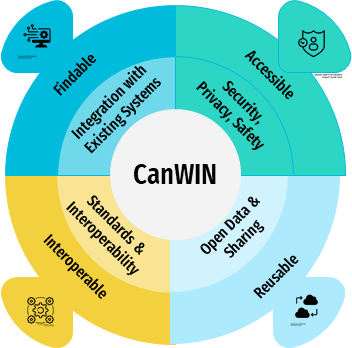CanWIN is mindful of the CARE, FAIR and OCAP principles for data sharing and supports the sharing of open data in a way that considers both people and purpose in open data advocacy. We support these principles through providing metadata and data that is:
Ethically Open: Making data open broadly without restriction, on an equal basis, with exemptions for ethical reasons;
Findable: Making data discoverable. By using web-enabled standards (e.g. schema.org, datacite) we make your data widely discoverable and accessible including to sites like Google dataset search and the Canadian Federated Research Data Repository;
Accessible: Building into existing UM infrastructure to safeguard against corruption and loss.By providing multiple options to share data users can ensure real co-creation of data in ways meaningful to communities who must be able to understand the data collected, at all levels from primary school to high school and beyond.
Interoperable: ensuring your data can be used and understood in the context of other data both by humans and machines. Interoperability means we can link in additional contextual data irrespective of where the data is physically stored and curated. We do this by using controlled vocabularies, cross-walking common metadata standards and working closely with other initiatives (e.g. Open Geospatial Consoritum, CCADI, Research Data Alliance); and
Reproducible: Through practices such as support for tools to share your code and creating detailed metadata records, we ensure your data is as reusable as possible so yourself and others understand how the data were collected and analyzed and who to contact for more information.

CanWIN Metadata Standards
CanWIN has developed metadata templates that follow the schema.org and DataCite 4.4 standards. Once users’ metadata is input into CanWIN it is cross-walked to additional standards used by our partners (ex.ISO19115-3:2013) to maximize interoperability and therefore accessibility of your data by other systems.
Contribute Data
Users can upload data to CanWIN by contacting a data curator at portalco@umanitoba.ca and by reading through the Publisher guide on this website. Data will be evaluated according to CanWIN curation standards and assigned a dataset level. Where possible, users can work with the CanWIN Data Team to curate their data to maximize the discoverability and usability of your data.
Access
CanWIN supports a limited number of open data license agreements. Metadata are freely accessibly without any condition. Data and data products may require:
- Website registration to obtain username and password;
- Acceptance of user conditions and terms for each data/data product as set by data owners.
Exceptions to the open, free, and unrestricted data access may include:
- Where local and Traditional Knowledge is used, rights of the Knowledge holders shall not be compromised;
- Where data release may cause harm, specific aspects of the data may be kept protected, or generalized to a broader geographic region (e.g. location to nests of endangered species, location to traditional owned areas, or locations to sacred sites).
The availability of data and data products may include an obligation by the users to contact the data source or designee to request permission to use the data. Where pre-existing data is already subject to access restrictions, CanWIN will work with the user on a sharing level that is right for them.
The default license for CanWIN is a Creative Commons license (CC BY). Creative Commons Attribution (CC BY) allows users to distribute, remix, tweak, and build upon the data, even commercially, as long as they credit the licensor for the original creation in the terms required by the licensor.
Data Acknowledgment
The users of CANWIN data must formally acknowledge data originators, contributors and sources. This acknowledgement should appear as a citation, such as when citing a book or journal article. In instances where formal citations are not possible, the use of ethical policies for data collection and data use are recommended. Our data team can help you with an attribution or acknowledgement statement.
Citation
Every project and dataset page contains a recommended citation. Users can choose from CanWIN's default citation styles, APA or Chicago, which automatically generate a citation. If a data provider has an alternative preferred citation, it will appear in the metadata under the Overview tab. The citation formats CanWIN follows are listed below.
APA Citation Style
Project
Template: Author_Surname, Author_Firstname M. (Publication Year). Title. DOI
E.g. Crawford, Alex D, Barber, David, Dahl-Jensen, Dorthe, Stroeve, Julienne C, & Serreze, Mark C. (2021). CEOS/NSIDC Extratropical Cyclone Tracking (CNECT). https://doi.org/10.xxxx/xxxx-xxx
Publication
Template: Author_Surname, Author_Firstname M. (Publication Year). Title (Version). DOI
E.g. Herbert, Claire, & Candlish, Lauren. (2021). CanWIN Whitepaper (Version 1.3). https://doi.org/10.xxxx/xxxx-xxx
Dataset
Template: Author_Surname, Author_Firstname M. (Publication Year). Title (Version) [Data set]. DOI
E.g. Crawford, Alex D. (2021). Northern Hemisphere Extratropical Cyclone Tracks (Version 1.0) [Data set]. https://doi.org/10.xxxx/xxxx-xxx
Chicago Citation Style
Project, Datasets and Publications
Template: Author_Surname, Author_Firstname M. "Title". Publisher, Publication date. DOI
E.g. Crawford, Alex D, Barber, David, Dahl-Jensen, Dorthe, Stroeve, Julienne C, and Serreze, Mark C. “CEOS/NSIDC Extratropical Cyclone Tracking (CNECT).” CanWIN, November 22, 2021. https://doi.org/10.xxxx/xxxx-xxx